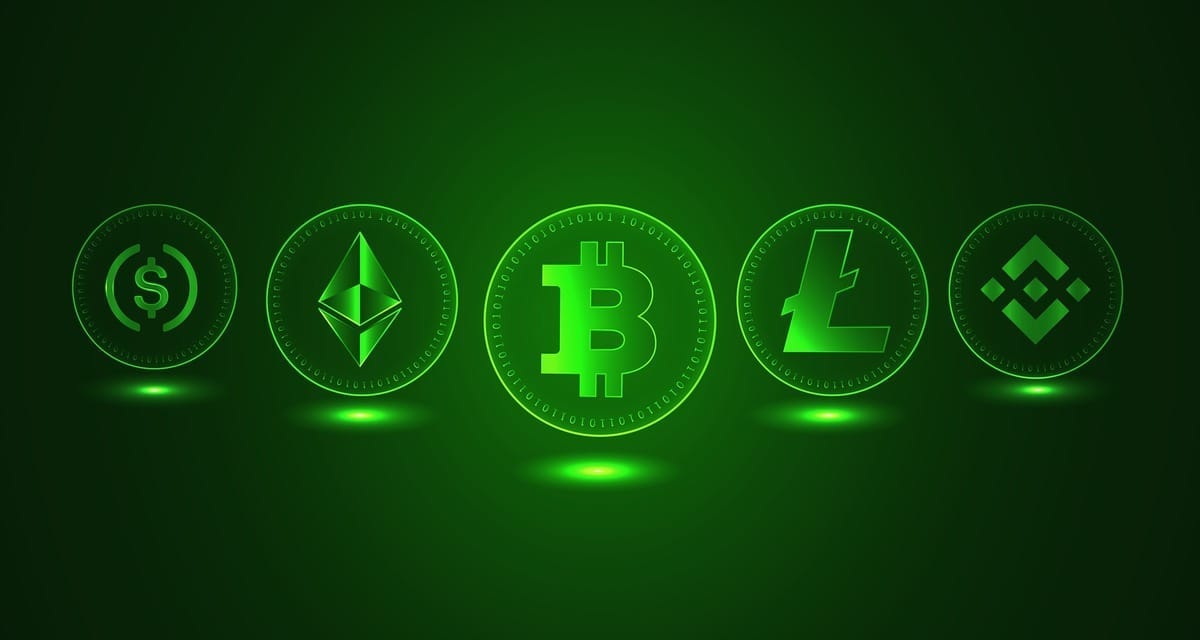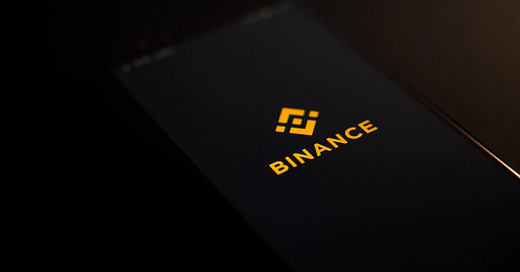☀️☕ CFTC sues Binance! Crackdowns continue
📊 Also: Sweet SVB Deal; Nervous banks may cool inflation 🎓️ The CFTC

Happy Tuesday!
📝 Focus
CFTC sues Binance! Crackdowns continue
📊 In the Markets
Sweet SVB Deal
Nervous banks may cool inflation
📖 MoneyFitt Explains
🎓️ CFTC - commodity futures and crypto?

📝 Focus
CFTC sues Binance! Crackdowns continue
The US Commodity Futures Trading Commission (CFTC)🎓 sued Binance, the biggest crypto exchange in the world, and founder Changpeng Zhao (CZ) on Monday for knowingly offering unregistered crypto derivatives products in the US against federal laws. It is charging Binance with violating laws around offering futures transactions, “illegal off-exchange commodity options,” failing to register as a futures commissions merchant, designated contract market or swap execution facility, poorly supervising its business, not implementing know-your-customer or anti-money laundering processes and having a poor anti-evasion program.

- Image credit: Satheesh Sankaran via Pixabay
.....► The lawsuit alleges that Binance operated a derivatives trading operation in the US, offering trades for cryptocurrencies including bitcoin (BTC), ether (ETH), litecoin (LTC), tether (USDT) and Binance USD (BUSD), which the CFTC refers to as commodities (not securities.) It is illegal to let US customers trade on any derivatives exchanges that have not been registered with the CFTC whether at home or abroad, which is why some of the bigger exchanges have "separate" US-only platforms (Binance US, FTX.us) for US customers to trade a more limited set of products, mostly just as cash transactions, i.e. not as derivatives.
.....► Binance, on CZ's instructions, allegedly also directed employees to use virtual private networks (VPNs) to "spoof" their locations while also directing important customers like big, high-frequency trading firms to set up shell companies in places such as Jersey, BVI and the Netherlands to avoid restrictions, under their "VIP Handling" policy. They also explained on their website how regular US retail clients could also use VPNs to mask their location to Binance (as big traders already did so they could connect directly to Binance's trading systems.) Binance says it blocks anyone who is a resident of the US and "anyone who is identified as a US citizen regardless of where they live in the world."
“On the surface we cannot be seen to have U.S. users but in reality we should get them through other creative means... We cannot teach users how to circumvent the controls. If they figure it out on their own, it's fine.”
Samuel Lim, Binance's chief compliance officer through January 2022 and who is also a defendant (allegedly, in an internal memo)
.....► This year, several US agencies have been cracking down on crypto. In February, US banking regulators suggested US banks should be careful around crypto deposits (which may have killed off crypto-friendly Silvergate Bank) and only last week, the US Securities and Exchange Commission (SEC) issued a notice to Coinbase, the largest US crypto exchange, that it might be illegal because it lists crypto tokens that the SEC deems to be securities -- though notably not Bitcoin. (Lending and staking had already been declared more or less illegal last year by the SEC.)

If you are enjoying The MoneyFitt Morning and would like to continue learning what's important in investing & business, please subscribe!

📊 In the Markets
European markets closed higher on Monday, with Deutsche Bank, the target of short sellers on Friday, up 6% at the close. It's still down 23% for the month, but at least it's not had to be rescued. Earlier, HK fell sharply on concerns that China’s post-lockdown rebound was much slower than expected, with profits in Jan-Feb at Chinese industrial groups down 23% compared to a year earlier, the biggest drop since mid-2020.
Meanwhile, US equities finished mixed, with bank stocks jumping after First Citizens BancShares bought a big chunk of the assets and deposits of collapsed Silicon Valley Bank. There are buyers out there, at a price, and hence a floor to the turmoil in the sector triggered by the back-to-back failures of SVB and Signature Bank. The move by First Citizens sent its shares skyrocketing 54%. Shares of other regional banks under the microscope, including First Republic Bank, Comerica and KeyCorp also rallied.
First Citizens' Sweet SVB Deal
The Federal Deposit Insurance Corporation (FDIC) said on Monday it would backstop a deal for small regional lender First Citizens BancShares (FCNCA) to assume Silicon Valley Bank's deposits of $56bn (with 17 branches) and assets of $110bn including loans of $72bn as part of the deal. The loans are priced at a 20% discount ($16.5bn) and First Citizens will also get a cheap $35bn loan from the FDIC (3.5% interest over 5 years.) The bonds that dropped in value and which led to the bank run that blew up SVB, will be kept by the FDIC. The combined bank will rank in the top 20 in the US with more than $200bn in assets. First Citizens will share any losses above $5bn on the new loans 50/50 with the FDIC, but if there are no losses, the FDIC will claw back up to $1.5 billion. Overall, the FDIC (which receives funding from insurance premium charges to banks, not taxpayer money) will take a loss of an estimated $20bn. Meanwhile, the FDIC will get "equity appreciation rights" linked to First Citizens' share price capped at $500mn.

The FDIC, seen here negotiating with the CEO of First Citizens BancShares
- Image credit: Our Gang (Little Rascals) / Hal Roach, WBD via Tenor
.....► First Citizens has basically put up no money of its own and is clearly making out like a bandit on the deal for stepping up and providing some kind of floor for the industry, particularly given that SVB was at the epicentre of the turmoil in global banking. The loss is projected to be FDIC's Deposit Insurance Fund's largest ever, much larger than the $2.5bn that the DIF will take on last week's sale of Signature Bank. The losses will effectively be borne by all bank depositors as paying for deposit insurance by member banks is fed through to them.
Nervous banks may cool inflation
Traders have, for now, shifted their worries from banks going under to tighter banking regulations, leading to a rise in costs for banks and more cautious bank lending having a negative impact on the economy... though this shouldn't be taken in isolation.
.....► Globally, bank lending caution is being recognised as anti-inflationary in its own right. In other words, either the banks cut back on lending on their own (or demand higher interest rates on their lending) and cause a slowing economy, which would tame inflation, or interest rates are pushed higher by the central banks and cause a slowing economy, which would tame inflation.
“You can think of (the banking sector turmoil) as being the equivalent of a rate hike or perhaps more than that”
Fed Chief Jerome Powell
.....► Fed Chief Jay Powell said as much last week: "the key is we have to have policies tight enough to bring inflation down to 2%" whether from higher policy rates from the Fed or market conditions that are tightening on their own. "Financial conditions seem to have tightened and probably by more than the traditional indexes say because... they don't necessarily capture lending conditions... The question for us is how significant will that be?"

A lot has changed in three weeks!
- Image credit: CME FedWatch Tool via MFM
.....► Interest rate swaps and futures markets are saying that the period of aggressive interest rate hikes since last year is over. Rates are likely to stay on hold at the US Fed, the Bank of Japan and several other central banks, while the ECB and Bank of England may have another hike before calling it quits. The debate is raging about the dual roles of central banks as monetary policy guardians and as the primary regulators of the financial system. “With the Financial Policy Committee in the case of securing financial stability, the Monetary Policy Committee can focus on its own important job of returning inflation (still over 10%) to target,” the BoE governor said.
.....► Meanwhile, the focus is turning (for now) from the US regional banks themselves to a credit crunch in commercial real estate (CRE), which is primarily driven by regional banks. The $5.6tn market for CRE loans is 70% from small and medium-sized banks in the US. Notably, New York Community Bank's acquisition of the Signature bank loan book excluded its CRE exposure. Commercial Mortgage Backed Securities bond prices (iShares ETF below) have already been weak throughout 2022, so the question is how much negative news is already priced in. Bigger picture, less lending could slow down construction activity and increase the likelihood of a recession.

Less than 20% of CRE loans are held in such bonds
- Image credit: TradingView

📖 MoneyFitt Explains
🎓️ The Commodity Futures Trading Commission (CFTC)
The CFTC is an independent US government agency responsible for regulating all derivatives markets in the United States, including futures contracts, options and swaps. It has a similar role to the Securities and Exchange Commission (SEC)'s with securities.
It plays a critical role in ensuring prices reflect actual supply and demand forces in the U.S. agricultural economy and works to prevent fraudulent practices and price manipulation while providing oversight and enforcement to ensure that all market participants are treated fairly.
Because commodities trading is a largely futures-based market and exchanges such as the CME have active futures markets in bitcoin (BTC) and ether (ETH), the CFTC has taken on oversight over futures and options trading of cryptocurrencies, but not (for now) spot transactions.





